After Dom Phillips murder in the Amazon, can his vision survive?
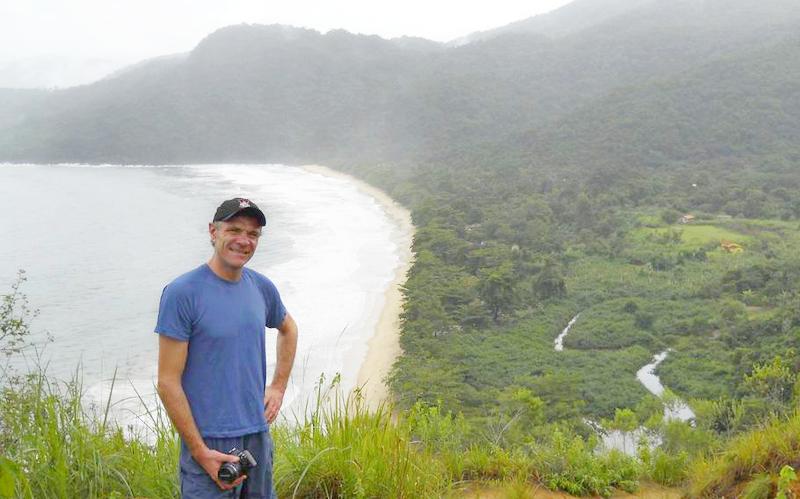
In this photo provided by Tom Hennigan, British Journalist Dom Phillips poses for a photo during a hike in Paraty, Brazil, on April 2, 2010. British journalist Dom Phillips’ quest to unlock the secrets of how to preserve Brazil’s Amazon was cut short this June 2022, when he was killed along with a colleague in the heart of the forest he so cherished. (Tom Hennigan via AP)
By DAVID BILLER - ASSOCIATED PRESS • June 19, 2022
British journalist Dom Phillips' quest to unlock the secrets of how to preserve Brazil's Amazon was cut short this month when he was killed along with a colleague in the heart of the forest he so cherished. Some of his discoveries may yet see the light of day.
Phillips in 2021 secured a yearlong fellowship with the Alicia Patterson Foundation to write a book, building on prior research. By June, he had written several chapters.
"Dom's book project was on the cutting edge of environmental reporting in Brazil. It was extremely ambitious, but he had the experience to pull it off," said Andrew Fishman, a close friend, and journalist at The Intercept. "We cannot let his assassins also kill his vision."
Phillips' disappearance and then confirmed death has brought calls for justice from Brazil and abroad from actors, musicians, and athletes, along with appeals for help to support his wife. Phillips would be gobsmacked to learn that his fate has troubled current and former U.K. prime ministers.
He wrote about Brazil for 15 years, in his early days covering the oil industry for Platts, later freelancing for the Washington Post and New York Times then regularly contributing to The Guardian. He was versatile but gravitated toward features about the environment as it became his passion.
Phillips often hiked in Rio de Janeiro's Tijuca Forest National Park and, atop his paddle board at Copacabana beach, was in his element: floating above the natural world and observing. He might message friends out of the blue, sharing news of spotting a ray with a 3-foot wingspan, reflecting a wonder more common among children than 57-year-old men, and he brought that spirit to his reporting.
He was curious and thorough, whether parsing studies of projected rainfall decline in the agricultural heartland caused by Amazon deforestation or tracking down the driving test administrator who discovered a man disguised as his own mother to take her exam. He recalled an editor telling him: "You spend too much time researching news stories."
Among local correspondents, he earned respect for his humility as well, often sharing others' reportage rather than tooting his own horn.
Phillips claimed the spotlight, inadvertently, during a televised press conference in July 2019. Noting rising deforestation and that the environment minister had met with loggers, Phillips asked President Jair Bolsonaro how he intended to demonstrate Brazil's commitment to protecting the Amazon region.
"First, you have to understand that the Amazon is Brazil's, not yours, OK? That's the first answer there," Bolsonaro retorted. "We preserved more than the entire world. No country in the world has the moral standing to talk to Brazil about the Amazon."
Within weeks, man-made fires ravaged the Amazon, drawing global criticism, and the clip of Bolsonaro's testy response spread among his supporters as evidence the far-right leader wouldn't be admonished by foreign interlopers. Phillips then received abuse, but no threats.
That didn't stop him from attending rallies to seek the views of die-hard Bolsonaro backers. He was alarmed by Bolsonaro's laissez-faire environmental policy, but mindful that prior leftist governments also had spotty records, often catering to agribusiness and building a massive hydroelectric dam that wrought calamitous local damage while vastly underdelivering. His allegiance was to the environment and those depending on it for survival.
Amazon deforestation has hit a 15-year high, and some climate experts warn the destruction is pushing the biome near a tipping point, after which it will begin irreversible degradation into tropical savannah.
Phillips spoke to farmers who deny climate change even as extreme weather threatens their crops. But he returned from a recent trip with spirits buoyed after meeting some reintroducing biodiversity to their land, said Rebecca Carter, his agent. After his disappearance, a video on social media showed him speaking with an Indigenous group, explaining he had come to learn how they organize and deal with threats.
"I'm grateful to have coexisted with a man who loved human beings," his wife, Alessandra Sampaio, told the newspaper O Globo. "He didn't speak of villains. He didn't want to demonize anyone. His mission was to clarify the complexities of the Amazon."
Phillips was also a crisp writer with an ear for readability. A 2018 story for The Guardian had one of journalism's most dramatic introductions:
"Wearing just shorts and flip-flops as he squats in the mud by a fire, Bruno Pereira, an official at Brazil's government Indigenous agency, cracks open the boiled skull of a monkey with a spoon and eats its brains for breakfast as he discusses policy."
Phillips described his 17-day voyage with Pereira through the remote Javari Valley Indigenous territory at that time as "physically the most grueling thing I have ever done." This June, he was with Pereira in the same region — it was to be one of his final reporting trips for his book — when they were killed together.
Three suspects are in custody, and police say one confessed. Pereira had previously busted people fishing illegally within the Indigenous territory and received threats.
Phillips, meanwhile, also had been preoccupied with risks to his professional future, betting on a book with wallet-wilting travel costs and praying it would resonate. He had set aside newspaper work to focus on it.
"I'm a freelancer with nothing but a book in my life and not even enough to live on next year while I write it," he told the AP in a private exchange in September. "Not so much all the eggs in the same basket as the entire hen house."
He and Sampaio had moved to the northeastern city of Salvador. He was charged up by the change of scene and teaching English to children from poor communities. They had begun the process to adopt a child.
Sampaio told the AP that she doesn't know what will become of her husband's book, but she and his siblings want it published — whether only the four chapters already written or including others completed with outside help. Phillips' optimistic message — that the Amazon can be preserved, with the right actions — could still reach the world.
"We would very much like to find a way to honor the important and essential work Dom was doing," Margaret Stead, his publisher at Manilla Press, wrote in an email.
The book's title was "How to Save the Amazon." Bolsonaro has bristled at the idea it needs rescue, saying some 80% of Brazil's portion remains intact and offering to fly foreign dignitaries over its vast abundance. But Phillips knew the view is different from the forest floor; big hardwood trees have been logged to scarcity in many seemingly pristine areas. His companions traveling through the Javari Valley celebrated when coming upon one.
"The Amazon is much less pristine and protected than most people think it is and much more threatened than people realize," he wrote to the AP in September.
He noted, with a hint of intrigue, that he recently visited a preserved area of a virgin forest full of massive trees. Places like that, he said, were usually inaccessible.
And where is that hallowed ground?
"You can read it in the book," he wrote, "when it comes out."
Bye, dear? Norway says ready to resume Amazon Fund with Bolsonaro's departure
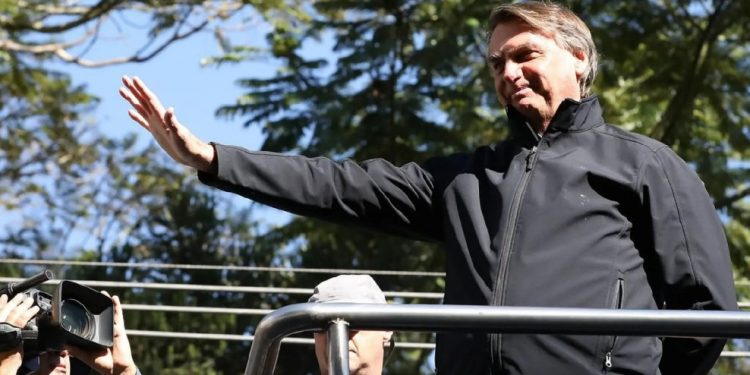
Jair Bolsonaro at an event held in the capital of Paraná, in May 2022. Photo: José Dias/Agência Brasil
Posted by brasilamaz 23/06/2022 on amazon
Norway is the largest donor to the Amazon Fund, which was paralyzed in 2019 after changes promoted in its management by then minister Ricardo Salles
Norway's Environment and Climate Minister Espen Barth Eide said the country is ready to resume payments to Brazil for preventing Amazon deforestation, through the Amazon Fund, should there be a change of government in this year's elections. That is if Jair Bolsonaro leaves the presidency.
Norway is the Fund's largest donor. Between 2008 and 2018, the Norwegian government transferred US$ 1.2 billion to Brazil, or around R$ 6.3 billion, which represents 93.8% of the total internationally donated. The resource was used in projects to prevent, monitor, and combat deforestation, and donations were based on the presentation of results.
The funding mechanism has been paralyzed since August 2019. That year, in addition to the beginning of an escalation in deforestation under the Bolsonaro government, the Fund was the target of intense attacks by the Federal Government, with unfounded allegations by then Minister Ricardo Salles about the existence of irregularities and changes in its management rules.
“If [the elections] go as the polls show and there is a change [of government] in Brazil, we have high hopes that we can quickly resume a good and active partnership,” Espen Barth Eide told Reuters news agency.
According to Eide, Norway's work on the Amazon Fund could be resumed “very quickly”, in a matter of weeks or months, “provided the opposition does what it says it will do” in relation to the environment.
Source: The Echo
Calls for justice amid fears inquiry into killings of Dom Phillips and Bruno Pereira stalling
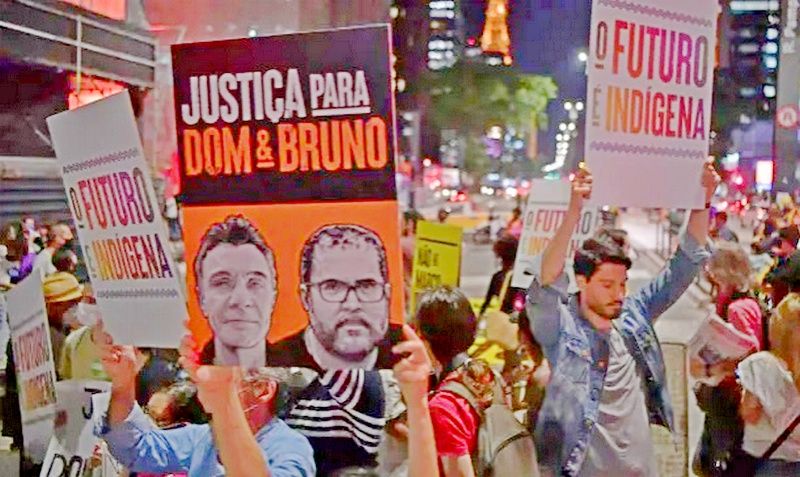
The Guardian - Oliver Laughland and Roberto Kaz in Atalaia do NorteFri 24 Jun 2022 00.31 BST
Scores of protesters have congregated outside the offices of Brazil’s Indigenous protection agency Funai in the riverside town of Atalaia do Norte, renewing calls for justice over the murders of journalist Dom Phillips and Indigenous advocate Bruno Pereira.
Three men are in custody and more arrests are planned, but the suspected murder weapon has not been found.
Demonstrators – mostly Indigenous people from the Javari Valley – held orange and yellow banners, which read: “Protection for our Amazon forest”, “Amazon resist! Who ordered the killing?” and “Out Bolsonaro!”, amid growing fears that the criminal investigation into the murders was slowing.
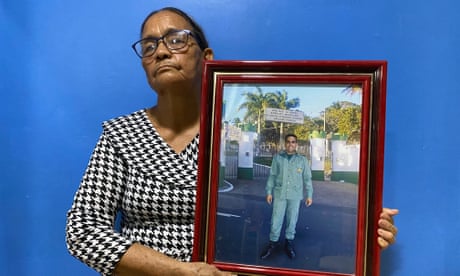
“In my land, the white man comes to impose fear. But we will not be afraid of the white man,” said Waki Mayuruna, an Indigenous leader and member of the Univaja collective. “We will keep defending our land. It’s not just today, this fight for our land is from long ago. We fight until the last Indian is alive.”
Many carried large banners and wore t-shirts bearing Phillips and Peirera’s faces alongside a picture of Maxciel Peirera dos Santos, the Funai agent who was shot dead in the nearby town of Tabatinga in 2019. “Justice for Dom and Bruno and Max,” said one sign.
Three men are currently in custody over the murder, but state police said on Sunday they were preparing to arrest five other suspects connected to the killing. The five men, investigators told the Guardian, were believed to have assisted the suspected murderers a day after the shooting by moving and burying remains.
But, as of Wednesday evening, no arrests had been made. Atalaia do Norte police chief Alex Perez said that investigators had yet to recover the suspected murder weapon used to shoot the two men, believed to be a shotgun usually used for hunting.
The gunman is said to have dumped it somewhere in the Itaquai river, where the murder took place, but state police currently have no divers to support the investigation.
On Thursday, forensic investigators from the federal police were examining two boats, one belonging to Pereira and the other to Jefferson da Silva Lima, known as Pelado, the suspected gunman. The illegal fisherman is said to have confessed to killing the men and leading investigators to where their remains had been buried.
The visit revealed how the suspected murderer’s boat was much smaller and had a substantially more powerful engine, supporting the police’s theory that Phillips and Peirera were ambushed from behind.
Investigators are understood to have found a shotgun pellet hole on the steering wheel of Peirera’s boat.
State police also confirmed reports that investigators believe Peirera, who legally carried a firearm, had fired back at the attackers but had already been fatally wounded at that point.
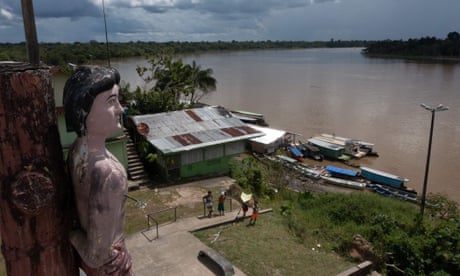
Peirera and Phillips were murdered in the Javari Valley, an increasingly dangerous, remote part of the Amazon rainforest. A combination of drug trafficking, illegal fishing, mining, and logging has proliferated in the area under Brazil’s president Jair Bolsonaro.
The far-right leader has cut back government presence in the region, with Funai and other government environment agencies stymied by budget cuts and personnel changes.
Indigenous leaders and security experts have argued that murders are directly linked to organized crime in the area. But Bolsonaro and local investigators have said the killings occurred due to a personal dispute with Pereira.
Phillips, a renowned reporter who covered the region in-depth, was a frequent contributor to the Guardian. Pereira a former senior administrator at Funai had been working in consultation with local Indigenous groups to bolster protections guaranteed under the Brazilian constitution.
The Javari Valley region, an area the size of Portugal, is home to one of the largest concentrations of uncontacted Indigenous communities in the world.
‘Dom Phillips was a natural storyteller – for us, he was always Uncle Dom’
Nieces of the journalist killed in the Amazon pay tribute to their uncle, who sent frequent and funny emails about life in Brazil
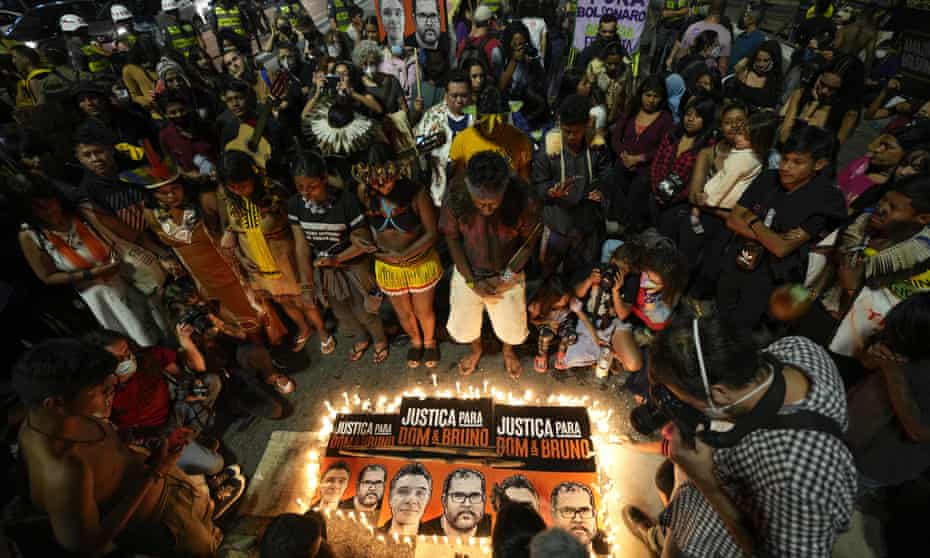
The Guardian - Rhiannon Davies and Domonique Davies. Sun 26 Jun 2022 11.16 BST
Dom Phillips was a storyteller. Throughout his career as a journalist, he told the stories of those who were unable to speak out and whose views were overlooked. His second book, How to Save the Amazon, aimed to do exactly this – to speak the story of the Amazon and the Indigenous people within it, and provide solutions to preserve their culture in conjunction with current Brazilian society.
For us, however, he was always Uncle Dom. He has been present in our lives since we were born and was very much involved with our upbringing when we were small children. He remained a positive influence, even when he moved to Brazil in 2007.
We have lots of happy memories with him. So many, in fact, that when we were thinking about what to write in this piece, we weren’t sure how to capture them. How do you find the words to explain how someone has been a consistently kind presence throughout your entire life? Which memories do you choose to share?
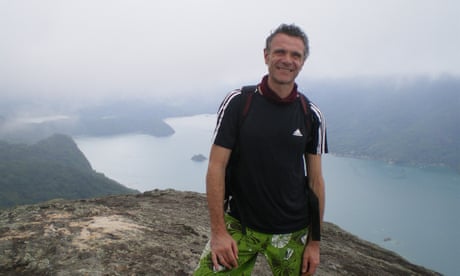
In the end, we realized that the best memories we could pass on are the ones that he shared with us through his regular emails about his life in Brazil. These emails, often accompanied with pictures, or links to articles, were full of stories and anecdotes – about what he was working on, about going to Carnival, about adopting his first cat (and eventually a second), about visits to the Amazon, and about meeting Alê, who he later married.
One of the first emails that he sent to us was on 22 March 2008. At the time, we were nine and 11, and Dom wrote to convey his new life in a way we could understand as children.
He told us: “Things are good here. People are very friendly and I have a lot of friends to hang out with. There is a lot of music too, always something to listen to or to go and see. Brazilians are very sociable, they like to go out, be together with their friends, and be in a big group of people. I have been lucky to get lots of invitations.”
Dom had been to carnival in Rio for the second time and had begun to establish himself, and build connections and friendships in Brazil. He had also got to grips with Portuguese a bit more, “not fluently. But enough to talk, read a newspaper, understand the news on TV.” Dom described the language as “very musical and fluid – a bit like the people.” Rereading his words 14 years later, we felt that this sentence summed up Brazil for Dom, and encapsulates his love for it.
Dom included some details about his swimming lessons in an open-air pool: “I have almost learned crawl. Trouble is, my legs want to do breaststroke because they’ve been doing it for so long. So my arms are doing crawl and my legs spinning round like I’m on a bike. Then my teacher shouts from the side of the pool: ‘Leave the bicycle at home! You’re pedaling again.’ Oh well, just keep trying.”
Just keep trying. Very Dom. He quietly persevered with everything he did, no matter the scale of the challenge.
On 23 September 2015, we were 17 and 19, quite a bit older than the first email. Dom had regularly kept in touch throughout this time, and we often met up when he visited the UK. By this time, he had begun to explore and get to know the Amazon and the Indigenous communities who live there.
Dom described Brazilian Portuguese as ‘very musical and fluid – a bit like the people’
He wrote in detail about the people who lived on those isolated reserves, who even then were “fighting loggers” for their land: “Among the nuts things I saw was a logging truck, laden with huge trees, totally illegal, no number plate – these trucks look like something out of Mad Max – rumbling late afternoon out of the reserve, broad daylight.”
Dom’s astonishment at the treatment of the Amazon is clear. Environmental destruction was taking place in broad daylight, before his eyes.
During this three-week trip, Dom spent time with a tribe called the Awá, who, he wrote, lived “very traditional lives, some still in the forest, very threatened”.
Dom depicted in detail how the tribespeople shared a hut between seven people: “I could see a tortoise tethered, two noisy little birds on a string, a large forest rodent, and a little ant-eater thing. There were two monkeys squealing on a shelf. Then I saw a little hammock, and thought, ‘Crikey, there must be a baby in there.’
“Another monkey, one of those with huge, round, surprised eyes, lifted its head up and looked at me. There was a baby, but it slept somewhere else. As for his [Dom’s guide’s] aunt and mother, they got tuberculosis and while recovering is still sick. Just shows how dangerous ‘contact’, as they call it, can be.”There is a war on nature. Dom Phillips was killed trying to warn you about Jonathan WattsRead more
Dom’s vivid description does not go without concerns about the safety of the Indigenous peoples and awareness of the risks, even those posed by his own presence on the reserve. Dom was very aware that this was not his land. His respect and awareness grew as he discovered more about Indigenous tribes and his work shifted towards environmental journalism.
Dom’s last email to us was on 27 April this year. Things had changed a bit – one of us was just about to start a Ph.D./master’s in criminology and the other part way through a Ph.D. in environmental humanities. Rhiannon had sent Dom her first co-authored article, and Dom replied: “Very impressive how all your academic careers are flourishing, I’m going to feel really uneducated next time we meet trying to keep up with you all!”
Even in these short sentences, Dom’s sense of humor comes through – of course, he was anything but uneducated. He taught us a great deal over the years and we’re really lucky to have had him in our lives. It’s impossible to comprehend that there won’t be a next time that we meet.
Over the last few weeks, Dom has become one of his stories. We, along with many others, will ensure that his narrative continues.
Commentary:
HUMAN SYNTHESIS
COPYRIGHTS
Copy & Paste the link above for Yandex translation to Norwegian.
WHO and WHAT is behind it all? : >
The bottom line is for the people to regain their original, moral principles, which have intentionally been watered out over the past generations by our press, TV, and other media owned by the Illuminati/Bilderberger Group, corrupting our morals by making misbehavior acceptable to our society. Only in this way shall we conquer this oncoming wave of evil.
All articles contained in Human-Synthesis are freely available and collected from the Internet. The interpretation of the contents is left to the readers and does not necessarily represent the views of the Administrator. Disclaimer: The contents of this article are of the sole responsibility of the author(s). Human-Synthesis will not be responsible for any inaccurate or incorrect statement in this article. Human-Synthesis grants permission to cross-post original Human-Synthesis articles on community internet sites as long as the text & title are not modified.
HUMAN SYNTHESIS